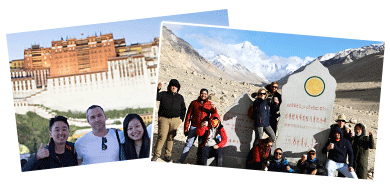
Tibetan nomadic tents
Living on the Tibetan Plateau, Tibetan people lead a life closely connected with nature. Generally, Tibet can be divided into farming areas and pastoral areas. We call those people living in pastoral areas Tibetan nomads who are one of the most interesting people on the planet. The pastoral people sometimes build houses as home bases for the old folks and for storage. Otherwise, they usually enjoy a nomad life and live in Tibetan nomadic tents.

Every nomadic family has several yak hair tents with the function of anticorrosion, worm preventing, easily dismantling and removing. In hot weather, every yak tents tends to be loose and soft, letting the plain wind blowing through and keeping fresh and cool inside. While in cold weather, the tent becomes to be tight again, keeping wind and rain out. Those are the major characteristics of the yak Tent.
There are two kinds of tents in the pastoral area: black yak wool tents and white cloth tents. The black Yak tents generally have no adornment, but whenever people build a tent, they will hang up the sutra streamers to bless the grassland will be flourishing and beautiful and all the living creatures will be healthy and happy.

The black yak tent is just a huge sky mastiff (sky spider) resting in the vast plain. At the top of the tent there is a smoke passage symbolizing the highest mountain’s tallest gate, which is opened to an infinite space. For millions of years, the sun, the moon and stars has been crossing this place in their eternal orbits.
To make a black yak wool tent, people use yak wool to make big ropes first, and then tie the ropes together. A good size tent, which covers about 28 square meters, requires about 90 kilograms of wool. The tent is square at the base with a window at the top that let smoke out and sunlight in. On a snowy day, the window can be shut.

The front part of the tent is split into two pieces to make a door. There is neither a bed nor a chair inside a tent. Rather, people sit on carpets and cushions. In the middle of the tent, an earthy fireplace is set up. Behind the fireplace, there are fuels (yak dung).
The tent is naturally divided into two quarters. Males occupy the left half, and females the right half. The inner part of the left side is the worshiping place equipped with Buddha statues, scripts, and lamps. The right side is for utensils and food storage.
Outside the tent, sometimes people build a wall of sod or dung to guard the animals or protect them against cold wind.

The smaller and elegant white tents in Tibet are usually special for Tibetan girls. The pastoral people have a couple of white cloth tent. The elegant tents are also good for travelling. In a religious or racing gathering, people come with white cloth tents. The elders, teens, and guests usually stay in this kind of tents. The fireplace is usually outside the tent. There are big hexagonal tents, well decorated with religious signs, mainly around monasteries or for the use of religious occasions.

Tibetan nomads always live in the remote, high elevation grassland regions of the Tibetan Plateau, such as Amdo, Kham, U-Tsang, Nagchu and Ngari in the Tibet. But, Tibetan nomad culture is quickly disappearing as more Tibetans each year are being relocated off of the grasslands. If you are planning to travel to Tibet, get off the beaten path in Tibet to experience a wonderful night with the interesting Tibetan nomads and have a good rest in the Tibetan nomadic tents.

My Name is Chloe, Senior Trip Advisor for Tibet trip with 5 years working experince in Tibet tourism. Loving Tibet, loving all beautiful thing around.A great funs of nature, with piercing eyes to find beauty in both Nature and People. Patient, Warm Hearted , Considerate, Easy- going , Knowledgeable and always ready to offer help to some one in need.


.jpg)




0 Comment ON "Tibetan nomadic tents"